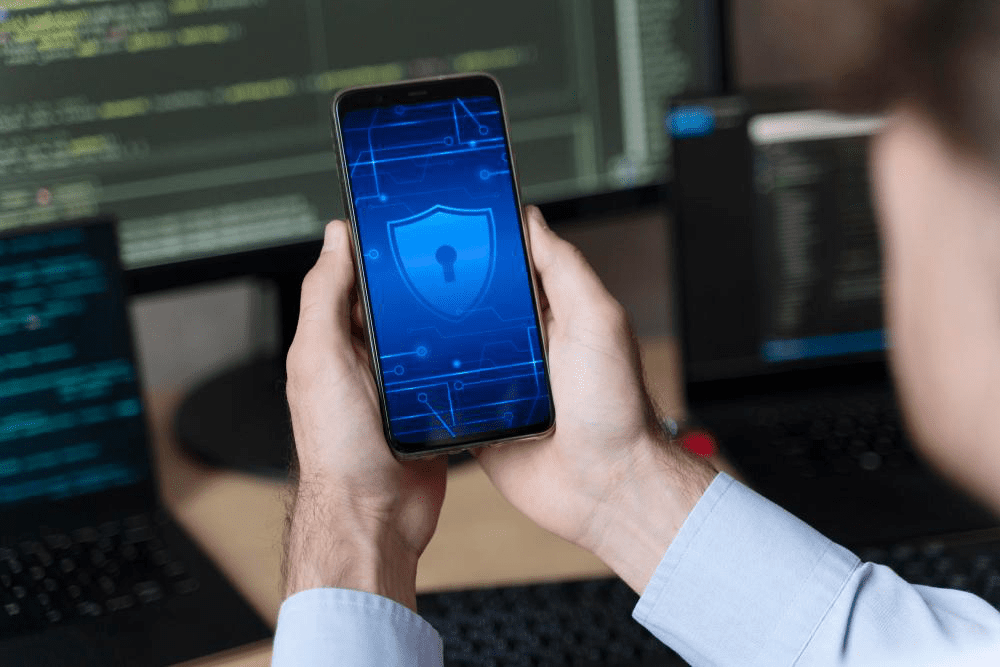Your iPhone is less likely to get a virus but the truth is that it’s possible. iOS’s strong security features include sandboxed apps and secure boot and frequent updates. Users benefit from end-to-end encryption, secure enclave and stricter App Store review processes.
Despite all these, your iPhone can get viruses from bad links, fake apps and phishing scams. Protect your iPhone by regularly updating iOS, enabling two-factor authentication and using strong passcodes. Here are security tips for your iPhone.

Credit: Freepik
How secure is my iPhone
It’s okay to feel confident because of the strong security features that Apple includes in iPhones. It adds hardware security like Face ID and encryption keys hidden in the Secure Enclave. iOS has other features like privacy controls to limit app access to your camera, location and microphone. Despite all these, you must pose at some point and ask yourself this important question: “How secure is iPhone?” Your device is strongly secure but many issues make it vulnerable.
Scammers and hackers use many strategies to access your device and control your data. They may use phishing scams, fake apps and sometimes jailbreak into your device. Never be surprised if you become a victim of these strategies and find a virus on your iPhone. No smartphone operating system is completely immune to viruses and scams. Learn how to protect iPhone from viruses by staying cautious to identify attack signs.
Can you tell if your iPhone’s cybersecurity is compromised?
You can safeguard yourself if your iPhone cyber security is compromised by observing how the device and apps behave.
- Your iPhone might experience slow performance.
- Your battery might drain fast due to network and CPU overuse.
- Check if you are receiving suspicious ads and pop-ups.
- Monitor your browsers for unrelenting redirects and hijacking signs.
- Apple may send you warnings via email if the threat is serious.
- Your device or apps might be reconfigured without your permission.
Actions to take if your iPhone is infected with a virus
Security for iPhone can be compromised because of downloading fake applications. You can also get attacks through infected links, scam websites and downloads. Here are easy steps to remove viruses and clean your iPhone after an attack.
- Open your browser settings and clear the cache and history. Browsers are important points through which viruses access your device.
- Log out of your accounts, such as banking, trading and social media apps.
- Change your passwords because you cannot tell if a scammer has cracked them.
- Restart your device and check whether the infection has cleared.
- If you find apps that you didn’t install, remove them. They could be the ones causing viruses.
- Update your iOS and all apps. This helps clear bugs and add security features.
- If the attack has changed configuration, restore it to your original configuration.
- If necessary, reset your phone to factory settings to clear the problem.
How to protect iPhone from viruses
iPhones do not enjoy total security, although they have top-notch protective features. Here are important cybersecurity steps you should take.
Disable location services and Bluetooth
Location services and Bluetooth may allow viruses to access your device. Disable these features if you are not using them. Limit permissions allowed on apps like camera, online wallets and social media.
Create backups
Viruses can delete all your data and disable important applications. Your phone may also suffer physical damage making it impossible to recover your information. Backups on the cloud or computer help you recover your data if something goes wrong.
Understand how attacks happen
Your phone can get viruses due to fake links, smishing, malware and phishing. Stay alert whenever you receive suspicious links, attachments or ads. Verify websites before opening them to avoid accessing scam content.
Update iOS
Make sure you always have the latest iOS version to benefit from stronger security features. Check updates regularly and install them immediately after release. They fix security gaps that hackers and scammers might use to access your data.
Install apps from the App Store
Apps from third-party websites are good but some might be fake and full of viruses. Apple subjects every uploaded app to rigorous security checks before allowing access by users. Downloading from the App Store helps improve your security and protect yourself from viruses.
Activate your Find My iPhone feature
Your Find My iPhone feature app is a security feature that allows you to locate your device if it is stolen or lost. This security for iPhone app lets you delete your data if you feel someone might compromise it.
Combine passcodes with biometric security
Passcodes integrate numbers, letters and special characters to create stronger account access permissions. Biometric security, such as Touch ID and Face ID adds the security strength of your device. It requires the use of fingerprint, eye scanning, face scanning or voice to authenticate you.
Use secured Wi-Fi
Avoid public networks to prevent easy hacking and virus attacks. Public internet points are often unsafe and hackers use such connections to easily access devices. The most secure connection method is secure Wi-Fi. Connect through a VPN if you must use public Wi-Fi.
Activate lockdown mode
Lockdown Mode is an extreme iPhone security measure for users in vulnerable places. Once activated, this feature reduces attack points by limiting most features. Activists and journalists may find this feature useful since they are often targeted for attacks.
Conclusion
iPhones do get viruses through vulnerable points like apps, links and browsers. Practice healthy internet habits to strengthen your device security. Understand attack signs like slowed apps and browser redirects. Protect yourself by updating iOS, using strong passwords and apps from the App Store. Back up your data and stay informed about cybersecurity. Change your passwords and restart your device whenever you notice attack signs. Cybersecurity trends change fast and your iPhone security should be your prime responsibility.



































